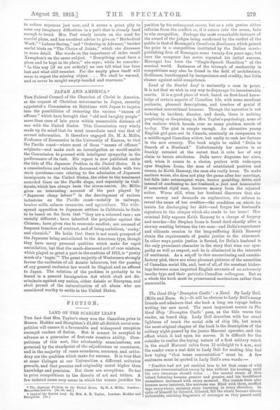FICTION.
LAND OF OF THE SCARLET LEAF.f Tun fact that Mrs. Taylor's story won the Canadian prize in Messrs. Hodder and Stoughton's 21,000 all-British novel com- petition will ensure it a favourable and widespread reception amongst readers of fiction. But it cannot be accepted in advanee as a guarantee of first-rate creative ability. Com- petitions of this sort, like scholarship examinations, are governed by the standpoint of the adjudicators or examiners, and in the majority of cases soundness, accuracy, and ortho- doxy are the qualities which make for success. It is true that at some Colleges at our Universities a different criterion prevails, and that promise and originality count higher than knowledge and precision. But these are exceptions. So too In prize competitions in the domain of art and letters. A few isolated oases may occur in which the winner justifies his * The Javanese Problem in the United States. By IL A. Milli& London, Macmillan and Co. [69. 6d. not.] t Land of the Scarlet Leaf. By Mn A. E. Taylor. London: Hodder and Stoughton, [69.) position by his subsequent career, but as a rule genius either refrains from the conflict or, if it enters into the arena, fails to win recognition. Perhaps the most remarkable instance of the award of the judges being confirmed by the verdict of the public is that of Ma scagnfe Cavalleria Rusticana, which gained the prize in a competition instituted by the Italian music. publishing firm of Sonzogno some twenty-five years ago; but here the composer has never repeated his initial success. Mascagni has been the "Single-Speech Hamilton" of the musical world. Instances of the triumph of mediocrity in competitions may also be found in the field of architecture. Brilliance, handicapped by inexperience and crudity, has little chance against solid competence.
Land of the Scarlet Leaf is eminently a case in point. , It is not that we wish in any way to disparage its incontestable merits. It is a good piece of work, based on first-band know- ledge of certain aspects of Canadian life, with some excellent portraits, pleasant descriptions, 'and touches of genial if somewhat conventional humour. Though the narrative is nob lacking in incident, disaster, and death, there is nothing perplexing or disquieting in Mrs. Taylor's psychology, none of the malaise which broods over so many problem novels of to-day. The plot is simple enough. Au attractive young English girl goes out to Canada, nominally as companion to a middle-aged Canadian widow, but really to seek her fortune in the new country. The book might be called "Delia in Search of a Husband." Unfortunately her motive is so frankly revealed at the outset that it robs her of any claim to heroic attributes. Delia never disguises her aims, and, when it comes to a choice, prefers with wide4Ipen eyes Stephen Irons, the man of established position and means, to Keith Ramsay, the man she really loves. To make matters worse, she does not play the game after her marriage. but falls into extravagant ways, incurs gambling debts, and instead of confessing to her husband, a just and honourable if somewhat rigid man, borrows money from the rejected suitor. Worse still, when her husband discovers that she owes money and demands an explanation, she refuses to reveal the name of her creditor—the condition on which he insists for discharging her debt—and forges her husband's signature to the cheque which she sends to her lover! Her criminal folly exposes Keith Ramsay to a charge of forgery and murder—for Stephen Irons is found dead shortly after a stormy meeting between the two men—and Delia's repentance and ultimate reunion to the long-suffering Keith Ramsay strain the requirements of poetic justice to the uttermost. In other ways poetic justice is flouted, for DeliLt's husband is the only prominent character in the story that wins our sym- pathy as well as respect, and he is eliminated in the interests of sentiment. As a setoff to this unconvincing and unsatis- factory plot, there are some pleasant pictures of the amenities of Canadian social life, and, best of all, of the constant bicker- lugs between some imported English servants of an extremely insular type and their patriotic Canadian colleagues. But as a whole the book must be pronounced meritorious rather than memorable.


































 Previous page
Previous page